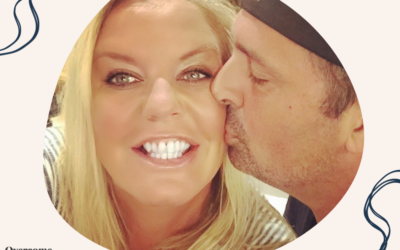In relationships, but especially a marriage, forgiveness is necessary regularly. There are little annoyances and big grievances that we have a choice to forgive every day. Sometimes I think the little annoyances are more difficult because they’re so daily and can wear you down.
I remember all the little annoyances that used to bother me as a young bride.
I went from a big family with lots of action and activity to living 24/7 with a quiet man. I loved the man of my dreams, but his quiet demeanor was the opposite of what I knew.
I fell in love with Jonas because he was strong and kind, and I had a fascination with this gentle, quiet man. Little did I know the day I said, “I do,” how deep his strength and kindness would go for me.
Early in our marriage, Jonas would get consumed with work in his body shop. He was always on a deadline knowing the customer would be upset if their car wasn’t ready when they came to pick it up.
Because he wasn’t very communicative and there were no cell phones back in the day, he would be distracted with his work and forget to come home on time for dinner.
I would be upset at this little annoyance and respond with the silent treatment. Always.
In the early days of our marriage, I would never have been able to say, “I’m sorry” or “Will you forgive me?”
It all seems so insignificant as I recall those early days, but still, the little things would build-up, and eventually, I would “get over it,” which meant I would never communicate about it.
As the little things turned into bigger and bigger challenges in our marriage, all I knew how to do was stay silent and stuff my feelings.
Stuffing is the opposite of forgiving. I couldn’t verbalize or humble myself to ask for forgiveness, and so the only thing left was to stuff.
All the stuffing nearly destroyed my life. Over the years, the silence made me sick spiritually, emotionally, and physically.
Being silent was the most significant stumbling block in my marriage and my own life.
I love a line written by the sister of a young man that lost her brother to drugs and suicide. She said, “Until someone has the courage to talk about the things that really matter, nothing will ever change.”
Talking about the important things, especially in marriage, instead of stuffing, is a matter of life and death. But even when my marriage was broken and falling apart, I was still not able to talk about what mattered and couldn’t verbally give or receive forgiveness.
This resulted in anger, bitterness, and a marriage that seemed impossible to be fixed or restored. In fact, I was on my way out of the marriage. I thought I had no other option.
We were facing big challenges as a couple, and forgiveness didn’t seem like an option, even though, in truth, it was the best option.
How important was forgiveness in our marriage?
It was a matter of life and death.
It was a matter of staying with my family or starting a new life without them.
I had a huge decision to make, and it marinated in my heart for several years. I couldn’t let go of my family but didn’t know how to stay when I had so much buried deep inside. I was in it over my head, and my heart was broken. I needed to forgive and be forgiven.
If you want a healthy life and marriage, forgiveness is necessary.
I had to surrender my feelings of anger, hatred, and animosity because of the hurt I experienced.
I had to stop blaming others and understand peace comes by taking responsibility for my share of the marriage falling apart.
Blaming never forgives and is always the reason for our sick, unhealthy relationships. It leads to bitterness.
Forgiveness takes away the need to be right, which, at its root, is pride. Pride can never forgive.
What I know today is forgiveness is an act of courage and not an act of weakness. Forgiveness shows strength, character, and love.
The opposite of forgiveness, unforgiveness, will say things like:
- “They were wrong, and I will never forgive.”
- “If I forgive, they will never change or learn their lesson.”
- “I can’t let them get away with the harm they have done.”
- “I will not condone their behavior.”
- “What they did was unforgivable.”
I said these statements, and nothing changed. I didn’t know yet that when we forgive, we heal.
That’s the whole point of forgiveness. It’s for our healing.
It’s not about the one who has offended you. It’s about you and your health.
Of course, our greatest example of forgiveness is Jesus. We all know He is the Son of God, and so we assume it was easy for Him to forgive. I don’t think that’s true at all.
His words as they crucified him were, “Father forgive them for they do not know what they are doing.” This shows me that His accusers and His suffering were so great that He cried out to His Father for help.
Despite all He experienced, He forgave so that we could live.
Maybe that’s what forgiveness is all about. We forgive our spouses so we can live but also so that they have the opportunity to live. It allows us the opportunity to live in peace and harmony as a couple.
A line that Jonas uses very often when he introduces me is, “This is my girlfriend. This is my best friend. This is my wife. She is the mother of my children and the grandmother of my grandchildren. Forgiving and staying together has kept life simple for us.”
Without forgiveness, we would not be enjoying the benefits of a marriage that has rich meaning and fulfillment. Both of us were able to forgive, and that’s why today, we are still one.
We became one the day we married, and forgiveness has kept us one, even after over 50 years of marriage.
If you’ve been deeply hurt in your marriage that you feel you want to call it quits, talk to someone that wanted to give up, and instead took the path of forgiveness and stayed.
I know there are real issues in marriages and impossible situations where you forgive your spouse but still need to end the marriage. I truly understand the reality of a marriage that is beyond repair.
To that, I say, forgiveness is still the answer for your well being, and it will help you move on to a life that can be fulfilling and happy.
I’m grateful I had the privilege to marry a quiet, God-fearing man who loved God more than he loved me.
At the lowest point in our marriage, Jonas took the advice of a counselor who told him he had a couple of options.
The first option was to leave the marriage.
The second option was to stay and choose to love His wife as Christ loved Him.
On the lowest day of his life, he chose to love and forgive me without conditions.
I am the recipient of forgiveness from a spouse who chose to love me rather than leave me.
To this day I am humbled by his love and forgiveness. It is a daily reminder of how important it is to forgive your spouse.




